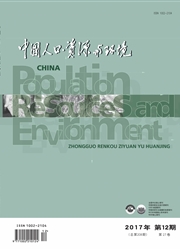

 中文摘要:
中文摘要:
从环境规制对全要素能源效率所产生的影响这一基本问题出发,通过引入“技术不会遗忘”假定,运用序列DEA-Malmquist生产率指数和考虑非期望产出的方向性距离函数测算了中国2000-2011年省际层面的全要素能源效率,并从环境规制实施的成本和实施后的收益两方面构造环境规制指标,以此为基础利用系统GMM估计方法验证“波特假说”效应在能源领域的存在性.具体而言,由于环境规制对全要素能源效率的影响既可能是正向的“创新补偿”效应,也可能负向的“遵循成本”效应,我们引入环境规制的平方项以考察潜在的非线性影响.研究揭示,时间维度上,全要素能源效率处于上升通道,但增长率一直下行,其主导因素是技术进步,并且技术效率一直羁绊全要素能源效率的提高.区域维度上,东部地区的全要素能源效率高于中西部地区.同时,无论是当期环境规制,还是其滞后一期值,环境规制与全要素能源效率之间均呈倒U型关系,即随着环境规制强度的增加,全要素能源效率先提高后降低,蕴含主导力量由“创新补偿”效应演变为“遵循成本”效应.能源的“稀缺性”与“外部性”两种自然属性对倒U型关系具有较好的解释力.此外,东部地区的环境规制倒逼全要素能源效率提升,而中西部地区的环境规制对全要素能源效率影响并不显著.一定程度上,本文支持能源领域存在“波特假说”效应,但存在“度”的限制.因此,本文的政策含义是,应该适度加强环境规制强度和合理选择环境规制工具,使得倒U型曲线的上升阶段更加显著与持久,同时避免不切实际,盲目提高环境规制强度的跟风行为.
 英文摘要:
英文摘要:
Focusing on the basic issue how environmental regulation affect total factor energy efficiency,we introduce the assumption of "technology does not forget" and estimate the total factor energy productivity of China' s 30 provinces during 2000-2011 with the methods of DEA sequence and directional distance function considering undesirable output.We construct indicator of environmental regulation from cost and benefit of environmental regulation,so as to verify the existence of "Porter Hypothesis" effect of energy.Specifically,due to the impact of environmental regulation on total factor energy efficiency can be beth positive " innovative compensation" effect and negative "compliance costs" effect,we have introduced square term of environmental regulation in order to examine the potential-nonlinear impact.The results indicate that total factor energy efficiency is showing a rising trend because of technical change,however,its growth rate is always declining and that is hampered by technical efficiency.In terms of regional dimension,the total factor energy efficiency of eastern region is higher than central and western regions.Whether the current environmental regulation,or its lagged value,the relationship between environmental regulation and total factor energy efficiency is inverted U-shaped.In other words,with the increase in the intensity of environmental regulation,total factor energy efficiency varies from rising to falling that imply dominant power varies from " innovative compensation" effect to "compliance costs" effect.The inverted U-shaped relationship can be explained well by "scarcity" and "externalities" of energy.Despite environmental regulation promotes total factor energy efficiency in eastern region,the effect is not obvious in central and western regions.To some extent,we support "Porter Hypothesis" effect of energy exists,but there is "quantity" constraints.As a result,the government should properly strengthen environmental regulation intensity and select
 同期刊论文项目
同期刊论文项目
 同项目期刊论文
同项目期刊论文
 期刊信息
期刊信息
